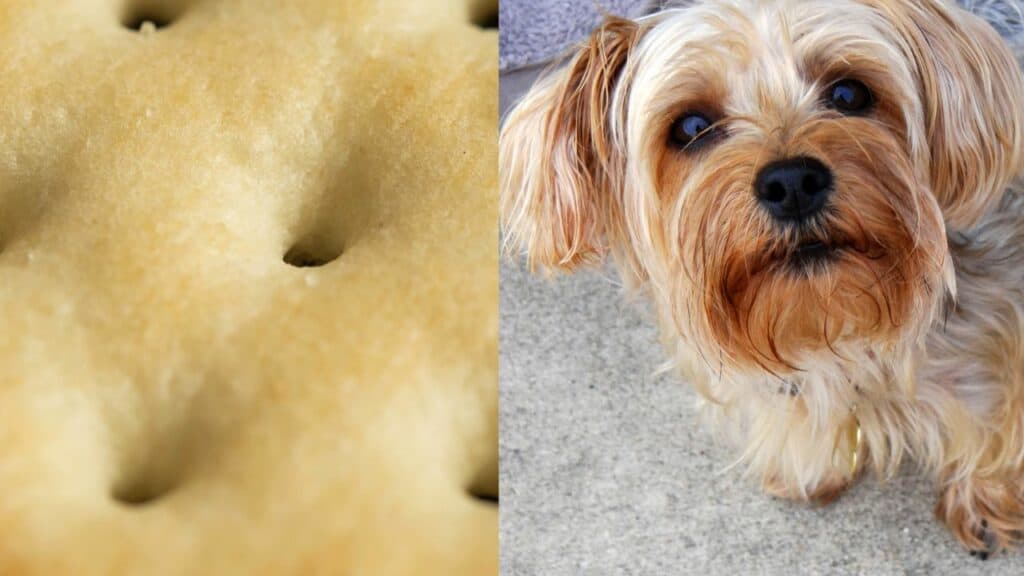Ritz crackers can be eaten on their own or with toppings, just like other quick and easy snacks.
Many dog lovers are used to sharing crackers with their puppies, but do you know what kinds of crackers dogs can eat?
Can dogs eat Ritz crackers?
No, dogs can not eat Ritz crackers and they should not be given to dogs.
Even a tiny amount of Ritz crackers can harm your dog’s health.
Bad health results from the sugar, salt, carbohydrates, and gluten that Ritz crackers contain.
Dogs with wheat allergies shouldn’t eat Ritz crackers.
Ritz crackers also include several ingredients that are harmful to dogs.
Dogs often watch their owners eat snacks, waiting for their bite.
Given the tasty smell of crackers, dogs usually see it as a treat.
However, before throwing your pup a piece, you must know which type of crackers are safe for dogs.
Ingredients Of Ritz Crackers

Here is the list of ingredients for Ritz Crackers:
Enriched flour, wheat flour
Niacin, teduced iron
Thiamine mononitrate vitamin B1
Riboflavin vitamin B2
Folic Acid
Canola oil
Palm oil
Sugar
Salt
Baking soda
High fructose corn syrup
Soy lecithin
Natural flavor
Following a review of the ingredients, the following are the ones that dog owners should be aware of:
Sodium
Unnecessary fat
Sugar
Wheat
Vegetable oils
Leavening agents
Why Are Ritz Crackers Unhealthy For Dogs?

Vegetable Oil
Dogs cannot consume Ritz crackers because of the vegetable oils used in their production.
Some vegetable oils used in Ritz crackers include soybean, canola, and partly hydrogenated cottonseed oil.
Owners of dogs should only administer the following kinds of oils to their dogs:
Coconut oil.
Fish oil.
Sunflower oil
Olive oil.
Flaxseed oil.
Enriched Flour
Ritz crackers’ main component is unbleached enriched flour.
Since unbleached enriched flour is wheat, please do not feed Ritz crackers to your pups if they have a wheat allergy.
The following are safe and healthy options for pet owners:
Amaranth flour
Whole-grain wheat flour
Oat flour
Coconut flour
Brown rice flour
Buckwheat flour
Almond flour
Whole grain flour is not unbleached enriched flour.
Most of the natural minerals and vitamins are not present in enriched flour.
You can see niacin, reduced iron, thiamine mononitrate (vitamin B1), riboflavin (vitamin B2), and folic acid on the Ritz crackers nutrition label since these essential vitamins and minerals were once again added.
Dogs who are allergic to gluten will manifest the following symptoms:
Intestine inflammation
Itchy skin leads to frequent licking and chewing of the feet
Poor skin conditions
Diarrhea
Poor hair or balding spots
Paw pads are inflamed
Chronic ear infections

Soy
Lecithin is beneficial and is frequently present in commercial dog food, but soy lecithin is not.
As the name implies, soy is the source of soy lecithin, which is frequently genetically altered.
Soy lecithin is also waste material.
When reading the ingredients, it’s simple to mix the two.
Since we are dog owners, we nearly missed this as well.
We strongly advise against feeding soy products to dogs.
Avoid giving your furry friends Ritz crackers if they have a soy allergy.
Leavening
Following leavening agents that are bad for dogs:
Yeast
Baking soda
Baking powder
Ritz crackers’ leavening ingredients have the potential to harm our canine friends in the following ways:
Heart problems
Seizures
Spasms
Take your dog to the vet immediately if you suspect he may have eaten some Ritz crackers because these symptoms are not always present.
Salt
Like carbohydrates, salt is a necessary nutrient for your pet’s diet, but your dog should get enough of it in their regular dog food.
If your pet consumes too much salt, it may become thirsty and urinate more frequently.
Additionally, it may pave the way for graver health issues like dehydration in your pet.
Five Ritz crackers, or one serving, contain 120 mg of salt.
Fat
Although fats do not raise cholesterol levels the way they do in people, they can still be high in calories and cause weight gain.
Ritz crackers may make your dog gain weight because dog food typically contains enough fat, and dog treats are known for being high in fat.
Ritz crackers have 2.5 grams of fat per serving.
Carbohydrates
Dogs consume a large portion of their protein from meat, and they only need a small number of carbohydrates daily to maintain good health.
Even though a few crackers won’t have much impact, most dog food brands already contain enough carbohydrates, so you don’t need to increase your intake.
Ritz crackers contain 11 grams of carbohydrates.
Fructose Syrup
High fructose corn syrup, a type of sugar, is even sweeter than regular table sugar.
In actuality, dogs should not consume sugar, including high fructose corn syrup.
High fructose corn syrup is also artificial. It is heavily processed and might contain mercury, which the FDA does not control.
It is a sweetener that can harm a dog’s teeth.
Because of this, we strongly advise dog owners to refrain from giving their canine companion food or treats containing high fructose corn syrup.
Many dog owners avoid feeding their pooch food or treat it with high fructose corn syrup.
Sugar
Even though you might not consider a cracker to have much sugar, it could lead to problems if your pet eats too many of them at once.
Sugar consumption can contribute to obesity, resulting in diabetes and other health issues.
Each Ritz cracker serving contains 2 grams of sugar.
What Happens If My Dog Eats Ritz Crackers?

While eating one or two Ritz crackers won’t harm your dog, eating five or more may.
Above mentioned issue is because of the Ritz crackers’ high salt, sugar, carbohydrate, and fat content.
Please try to refrain from regularly giving your dog Ritz crackers, as doing so can cause obesity and diabetes in dogs.
Dogs with soy or gluten allergies may become sick immediately after eating Ritz crackers.
My Dog Ate Too Many Ritz Crackers – What Should I Do?
If you suspect that your puppy has overeaten food or has eaten anything hazardous, it is essential to consult with your veterinarian before making an emergency appointment with your veterinarian.
Ritz Cracker requires consuming very much to cause serious problems for the user.
You should be monitoring the symptoms like lethargy, vomiting, and diarrhea.
The primary cause of dogs overeating is stomach upset.
Symptoms can include pancreatitis and bloating.
Tell your vet the symptoms you have for your dog that can lead to difficulty breathing.
Conclusion: Can Dogs Eat Ritz Crackers

You now know that dogs can not eat Ritz crackers.
Ritz Crackers have several ingredients that can lead to weight gain in your pet.
If dogs eat too many Ritz crackers, their high salt and fat content can be problematic.
The flavorings, sugar, and other ingredients can harm dogs in some ritz cracker flavors.
Before You Go…
Now you know the answer to the question, “Can dogs eat Ritz crackers?”.
If you want to learn more, read the following articles too!


